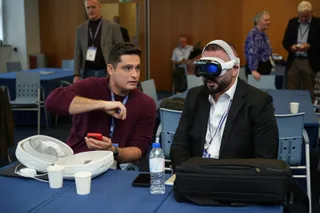EATS23 Pre-Launches with HoT, HoT Roundtables
Contact Our Team
For more information about how Halldale can add value to your marketing and promotional campaigns or to discuss event exhibitor and sponsorship opportunities, contact our team to find out more
The Americas -
holly.foster@halldale.com
Rest of World -
jeremy@halldale.com

For me, the Heads of Training (HoT) meetings which precede the European Aviation Training Symposium (EATS) are an annual sanity check. The HoT meetings – one for pilots, one for cabin crew – feature ‘Chatham House’ rules, which basically means ‘What happens in Cascais, stays in Cascais.’
The airline leaders freely speak their minds, and their takes on the issues facing training and safety in aviation are packed with insight and passion.
Initiated several years ago by Peter Moxham at the urging of EASA, the HoT meetings address a range of topics which offer different and often overlapping sets of challenges. No one is better positioned to tackle those challenges than the 100+ training leaders in the packed conference room.
In Cascais, each of the tables of eight included a SME who prompted the themes, a student pilot from a local flight school in Portugal (new this year, and a great opportunity for them to network and learn), and a representative of EASA who absorbed the commentary to take back to their peers in Cologne.
This year, the small groups honed in on these topics:
- CBTA
- Airline Pilot Preparedness
- Technical Competencies and Tools
- Non-Technical Competencies
- Instructor Standardization
- Pilot Career Progression
- Sky Talk Aviation English
- UPRT
- Safety Promotion
- Sustainability in Initial Aviation Training
Chatham House rules allow the ideas discussed to be shared, but not attached to any individual names or organizations. Some of the questions raised and comments at the tables I sat in on (representing 3 sessions of the total 30):
“Is the syllabus adequate? It hasn’t changed in so long.”
“Regulation, globally, needs to change more quickly.”
“It’s hard to find traction with national authorities; they are missing the expertise to be able to provide feedback.”
“We must put in the time, money and effort to develop instructors.”
*There are multiple EBT manuals being produced by industry; this may create confusion, including guidance which conflicts with regulation.”
“Should we audit ATOs? As an industry, are we condoning selection-by-payment-ability?”
“Smaller airlines are poaching instructors from ATOs.”
“Should we allow experienced FOs two years off to teach (instead of 500-hour CFIs)?”
“Is career progression inhibited by the seniority system? As an industry, are we promoting mediocrity?”
“Seniority helps standardization, stability.”
In the Cabin Crew HoT, discussions included EASA’s guidance for addressing crew attestation, and the effects over the past 12 months. The group of about 30, an equal mix of men and women leaders, also pondered the challenges of training younger generations.
One lament was the lack of loyalty, the willingness of flight attendants to change airlines. “It’s becoming very transient. And problems are being transferred from what was learned, maybe incorrectly, at other carriers.”
The HoT sessions were hosted by EATS Chair Captain Jacques Drappier, and organized by Captain Andy Mitchell of the ATPG, Halldale’s Allyson Kukel, and Anna Mellberg Karlsson of Novair.
Earlier on Day Zero, Thomas Leoff led a meeting of members of the International Association of Aviation Personnel Schools (IAAPS).
Day One of EATS 2023 begins Wednesday morning with a welcome from the Major of Cascais, Carlos Carreiras, followed by presentation streams for pilots, ATOs, and cabin crew.


